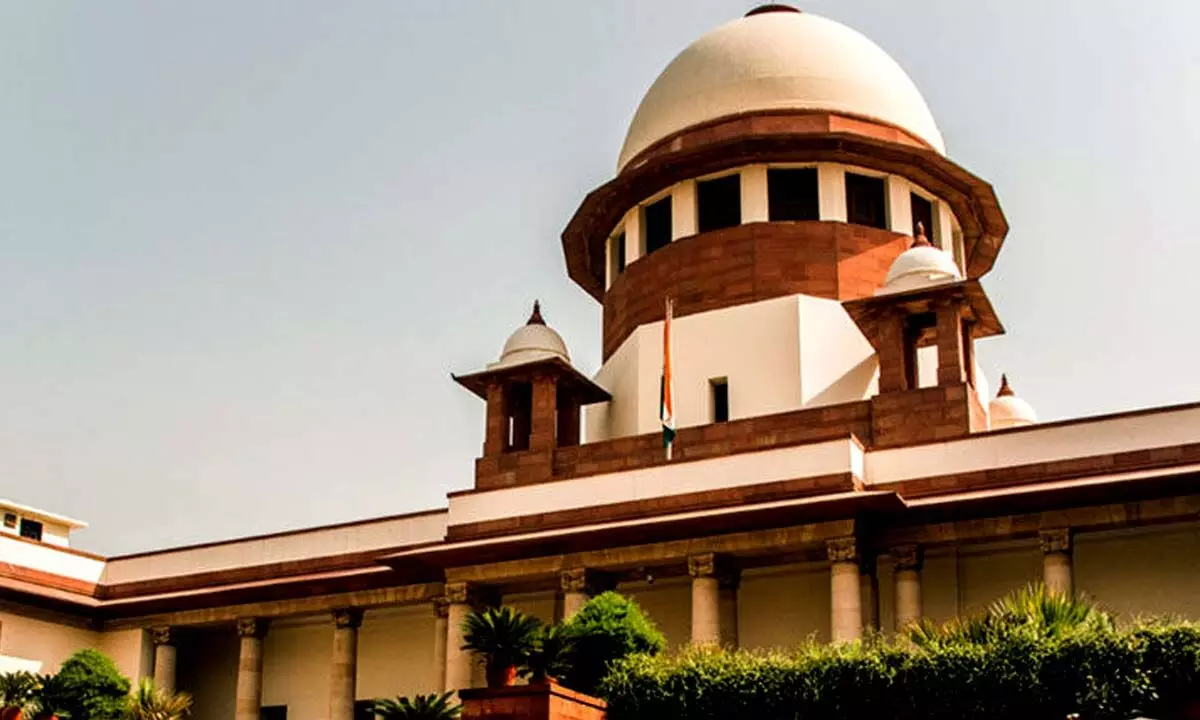Live
- Gadkari on accidents: I try to hide my face in meetings abroad
- Abetment of suicide: Mere harassment not sufficient to find accused guilty says SC
- 6.79L homes to receive water under Amrut-II
- Cops prohibit assembly of 5 or more near Group-II exam centres
- Avanthi, Grandhi quit YSRCP, lash out at Jagan
- Dharani portal services paused till Dec 16
- Komuravelli Mallanna Swamy Jatara from Jan 19
- Study tour for TG legislators soon
- State cabinet expansion by Dec 31: Ponguleti
- 2 Narayanites bag gold medals in IJSO-2024
Just In
Nominated members can't go for election, constitutional provision clear, Supreme Court on MCD mayoral polls

Supreme Court of India
The Supreme Court on Monday orally observed that the nominated members cannot vote in the election for the mayor of a municipal corporation.
New Delhi: The Supreme Court on Monday orally observed that the nominated members cannot vote in the election for the mayor of a municipal corporation.
During the hearing, the office of the Delhi Lt Governor told the court that it would postpone the February 16 mayoral election to a date after February 17.
A bench headed by Chief Justice of India D Y Chandrachud orally observed that nominated members cannot go for the election and the constitutional provision is very clear.
Senior advocate Abhishek Manu Singhvi, representing the petitioner, contended before the bench, also comprising Justices P.S. Narasimha and J.B. Pardiwala, that Article 243 R of the Constitution makes it very clear. Additional Solicitor General Sanjay Jain, representing the office of Delhi LG, suggested that the election scheduled on February 16 can take place after February 17.
At this, Chief Justice Chandrachud queried Jain: "Are you disputing the fact that nominated members should not vote, that is very well settled. That is a clear constitutional provision."
As Senior advocate Maninder Singh said: "We should get an opportunity to convince the lordships that may be permissible...," The Chief Justice asked under which provision it is permissible?
Singh said the provision under which it permits members to be part of standing committee and they become full-fledged members and urged the top court to grant some time to argue the matter. Singhvi, however, said there is a fallacy, corporation aldermen are excluded and, in the corporation, they are specifically excluded and in the standing committee they can vote, "and we are not on standing committee".
Singh replied that is for the argument which has to be considered.
The bench said that they will be permitted in a committee is a different aspect of the matter. Singh said there are three committees which constitute the corporation itself.
The top court was hearing a petition filed by AAP leader Shelly Oberoi in connection with the election of mayor of the Municipal Corporation of Delhi (MCD).
Advocate Shadan Farasat, representing Oberoi, submitted that the petitioner is seeking two directions - nominated members shall not be allowed to vote and elections of mayors, deputy mayor, standing committee should be separate.
He said this is clear from the black letter of law and also relied on Section 76 of DMC Act to argue that the Mayor and Deputy Mayor have to preside over all meetings. It was argued that the simultaneous holding of elections for three posts (Mayor, Deputy Mayor and standing committee members) is contrary to the DMC Act.
The top court has scheduled the hearing in the matter on February 17.
Earlier this month, the apex court had sought response of the office of the LG, pro tem presiding officer Satya Sharma of the Municipal Corporation of Delhi (MCD) and others on Oberoi's petition.

© 2024 Hyderabad Media House Limited/The Hans India. All rights reserved. Powered by hocalwire.com






